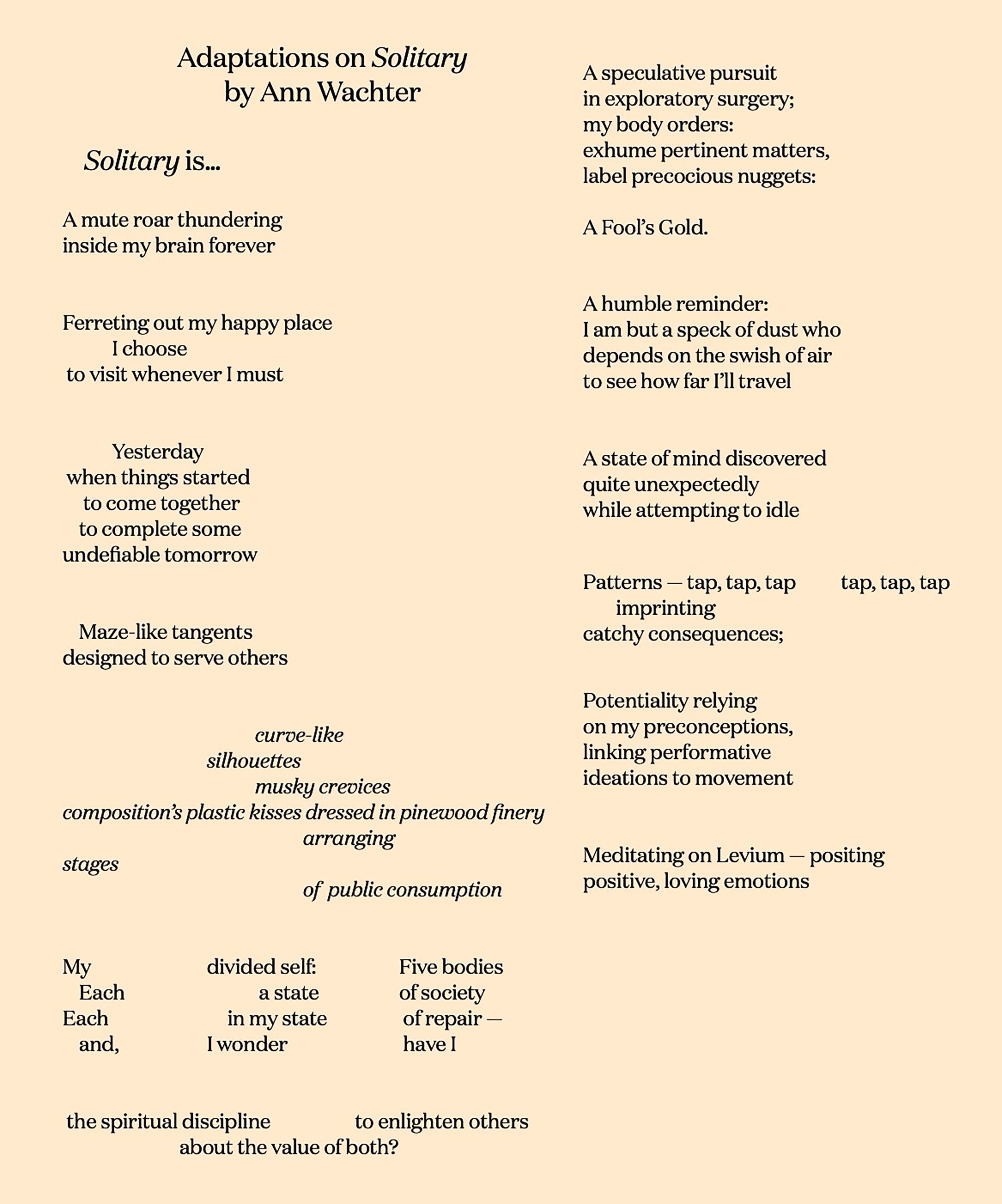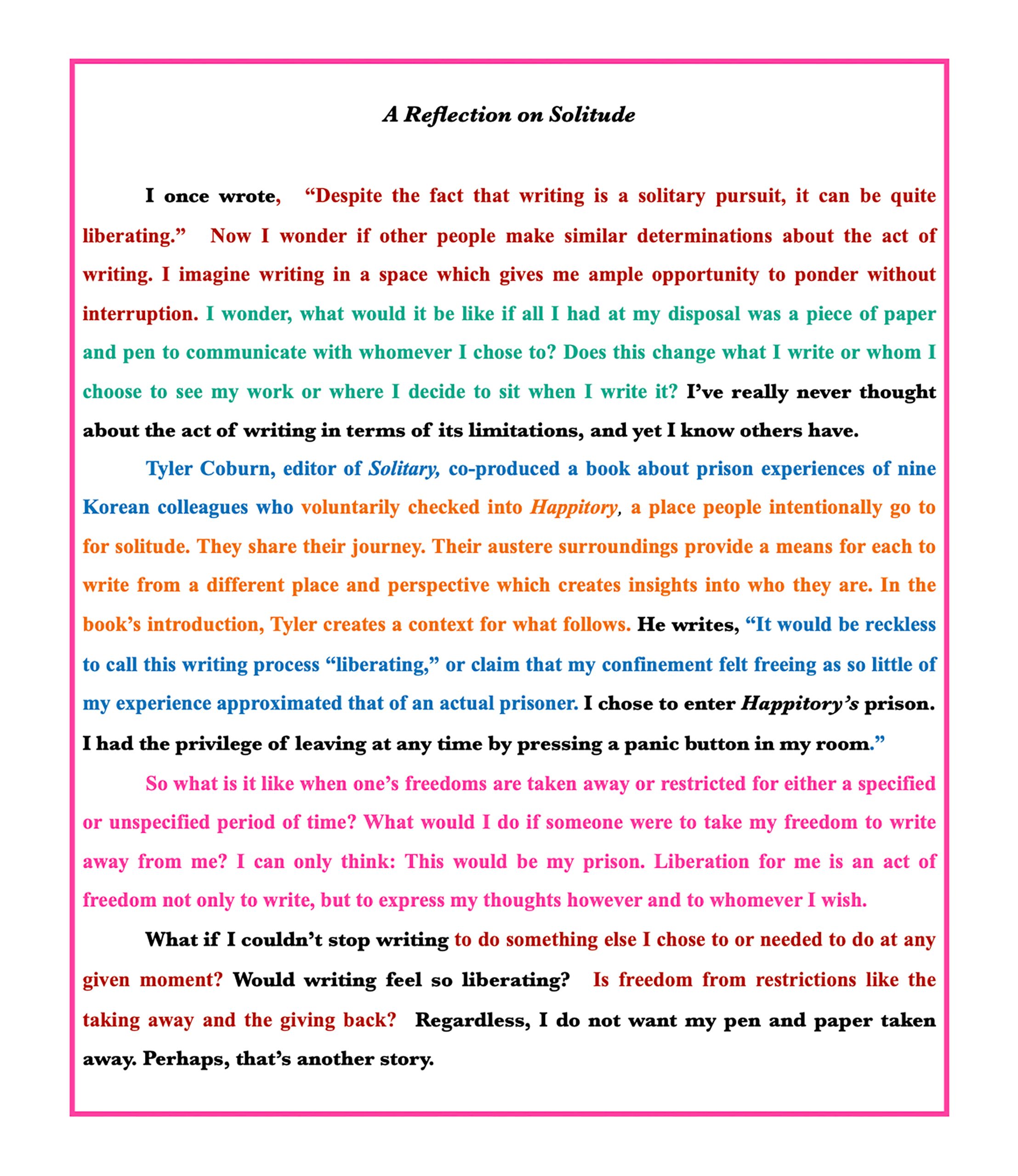Gallery of Speculation
In order to understand the significance of speculative engagement from an artistic perspective, I wish to quote the ‘Introduction’ of Marina Vishmidt’s edited work titled Speculation : Documents of Contemporary Art. Vishmidt quotes Henk Slager’s idea that speculation begins with method; a process of questioning which asks: “how could we engage in that assignment of reconsidering the revealing speculation in order to arrive at a novel panorama and ‘not-yet-known-knowledge?” (10) Vishmidt also states, “Speculation, thus, as a method as well as a field of study and praxis, is one that necessitates a situated perspective to shift, but also its readiness for that perspective to shift, both in light of its objects and the shifting problematics and imperatives of knowledge production in its social, historical and economic relations and antagonisms.” (11) She further describes the notion that the speculative acts like a ‘vector of transformation’ when it is ‘brought into contact with the ‘materialist’ or ‘social reality’. (Ibid). In my mind it is anticipatory and to some extent constructed in order to promote this ‘vector of transformation.’
Banned Books
Speculative letters between myself, and Midwestern author, Mikki Kendall, create an awareness around judicial decisions condoning book bans. It is a fact that Hood Feminism, was censored and banned in Texas in 2021. (https://www.newsweek.com/black-authors-are-beingpulled-school-libraries-over-critical-race-theory-fears-1669403), and that Mikki Kendall publicly reacted to the ban.
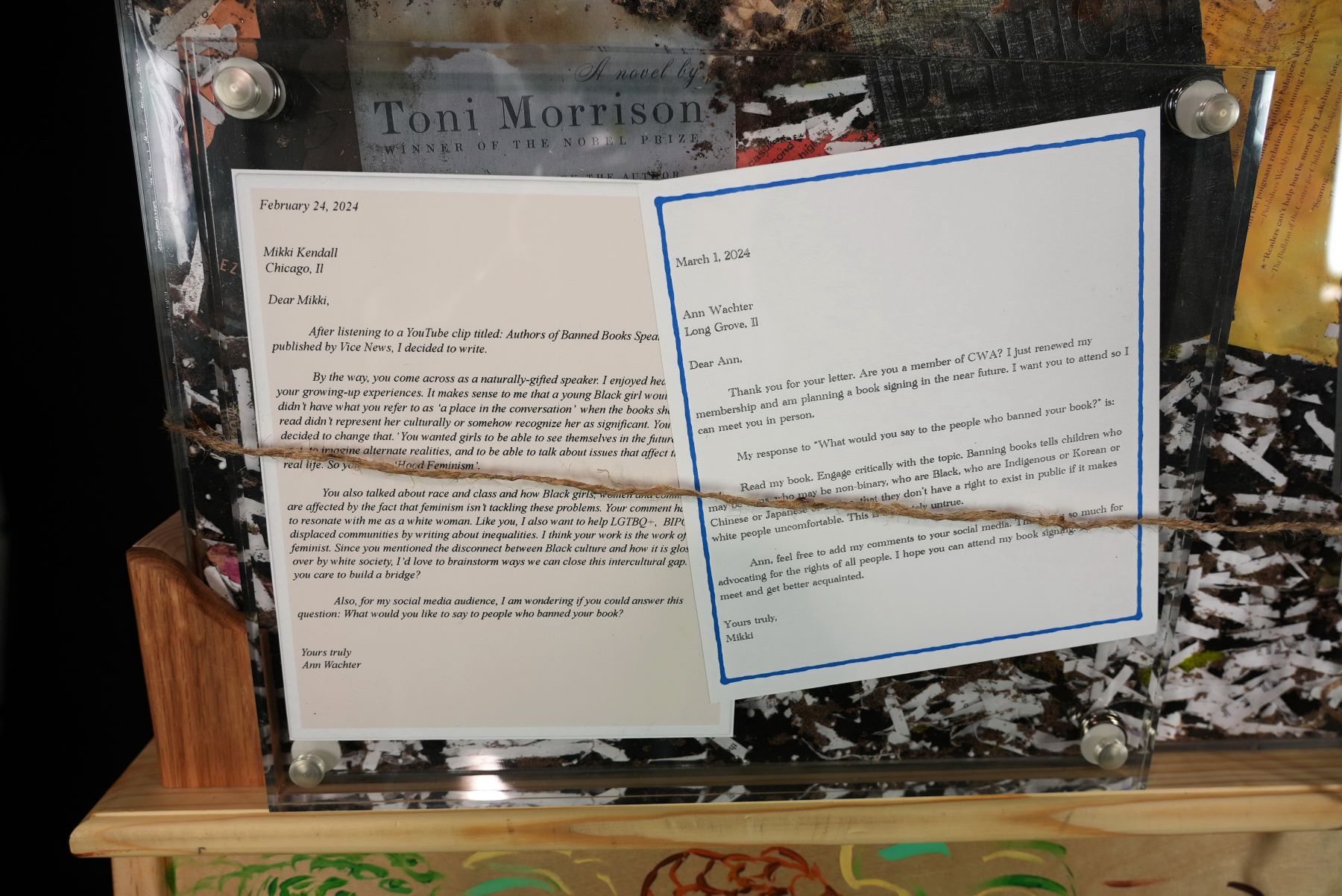
Ann Wachter to Mikki Kendall & Mikki’s Reply
English typeset in black ink
on Card Stock, 8 x 11 inch
Kendall’s work is one example of the type of book subjected to banning in a variety of school districts throughout the US. These books are typically written by BIPOC populations on topics of racial disparity and LBGTQ+ experiences. Book bans have quickly expanded to include established classics such as Belovedby Toni Morrison and To Kill A Mockingbird by Harper Lee.
Kendall garnered a lot of favorable media attention for her work, circa 2023. Chicago Today interviewed her about the same time NBC 5 Chicago featured an article titled Banned Book Club March pick: Hood Feminism by Mikki Kendall.
Global Implications
Book bans span US history and are a global phenomenon. Yalqun Rozi was appointed by the Chinese government to serve as an author, educator and editor in the Uyghur region, a geographic area once populated by the Uyghurs, a people of Turkic origins. Beginning in October of 2016, Uyghur intellectuals, later including Mr. Rozi (circa 2017), were arrested for performing their duties. His life’s work, which centered on the history and culture of the Uyghur people, was collected and destroyed. Rozi’s wife and children now reside in the US, longing for his safe release
This speculative letter—written from the persona of a former eighth-year student who once resided in the same region—sets up a global conversation about topics of censorship and penal offenses. The student is a friend and former classmate of Rozi’s son. They both attended CUNY. In college, the student learns of his friend’s father’s plight and decides to write to Mr. Rozi. The student expresses his gratitude and good wishes for all Mr. Rozi did to preserve their cultural heritage.
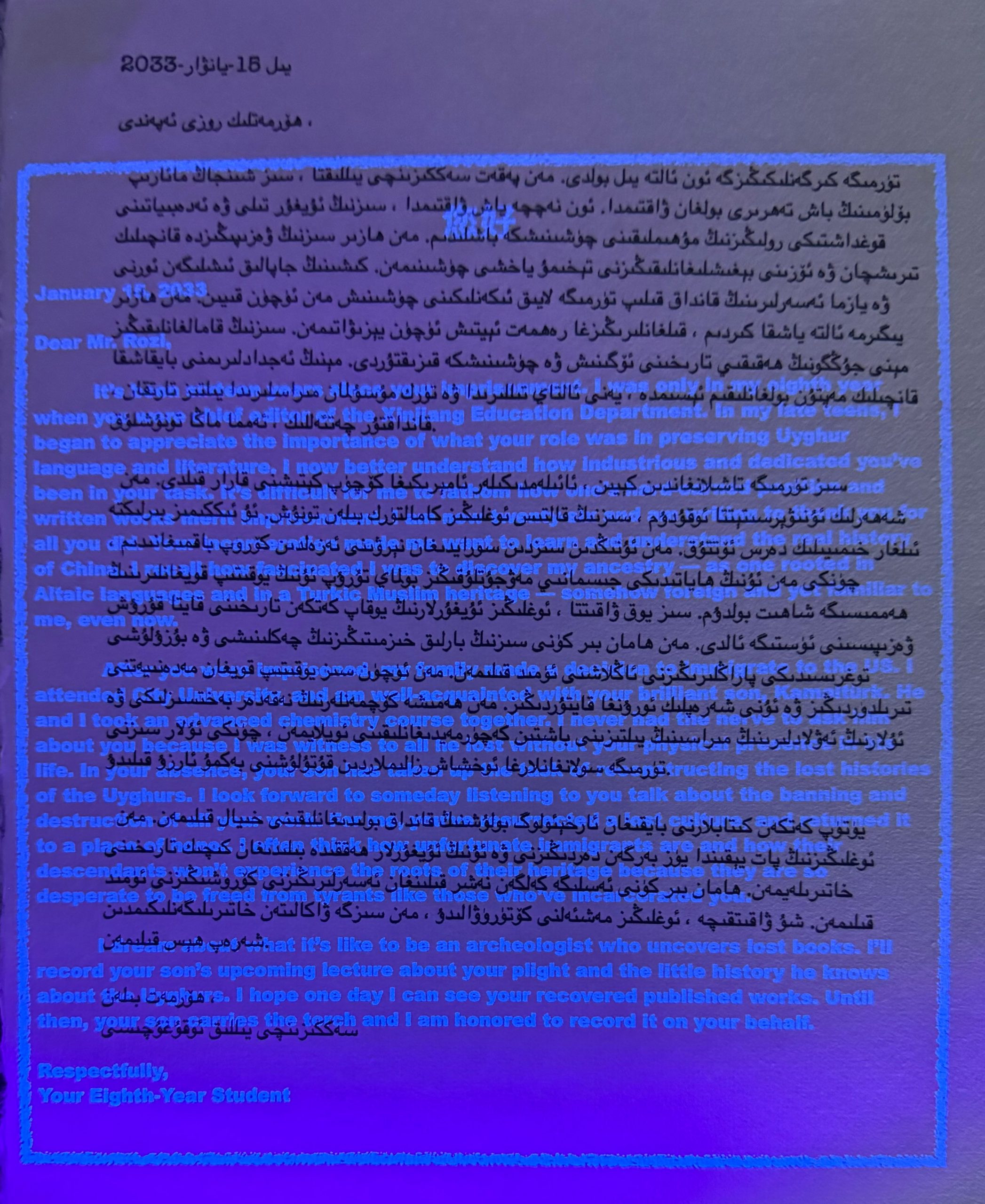
8th Grade Student to Yalqun Rozi, (2024)
English typeset in invisible ink
Uyghur Translation in black ink
On Awagami paper, 8 x 10 inch
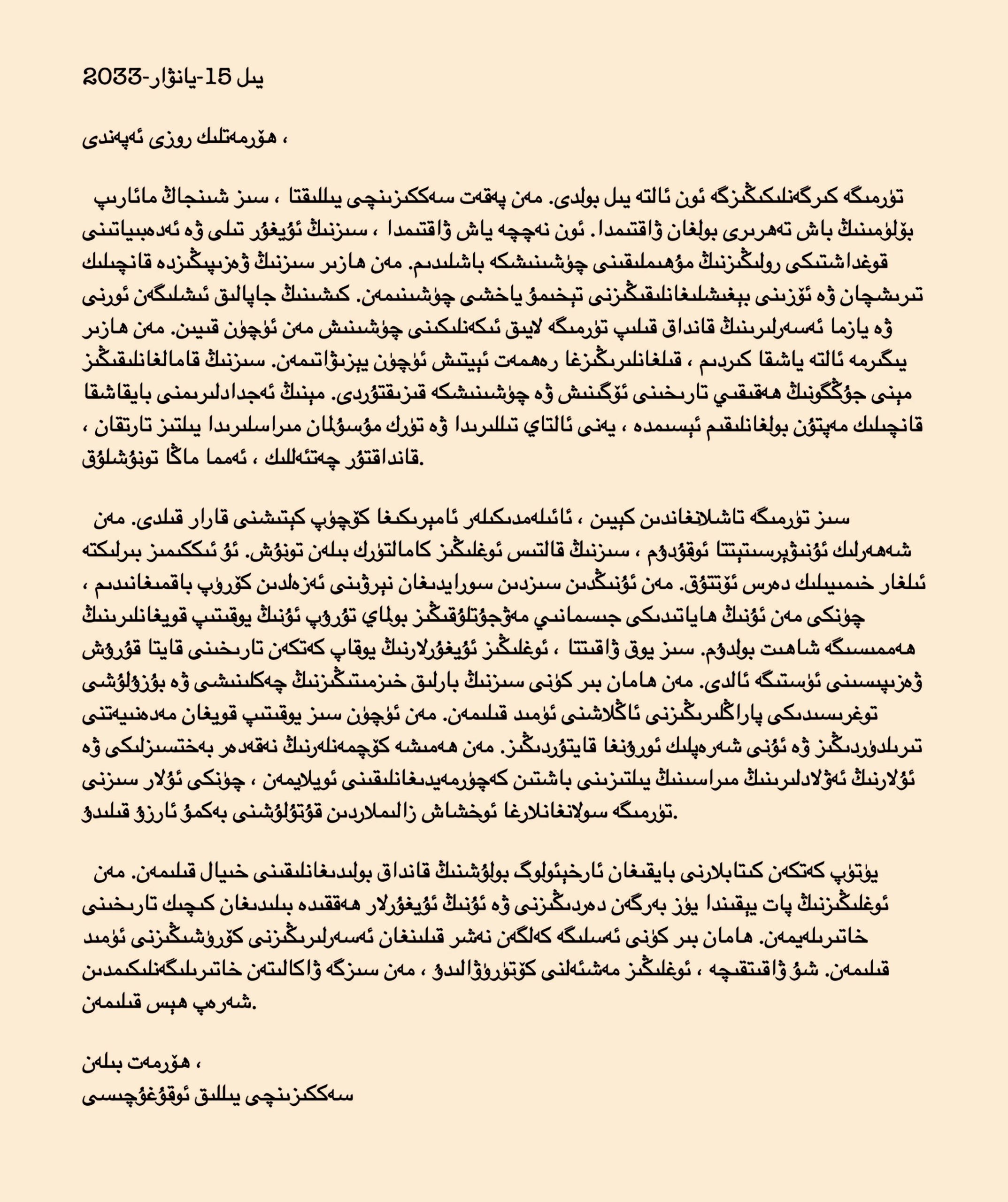
Footnotes:
[1]Ingram, Ruth. Long prison sentence for book loving Uyghur who tried to preserve history and culture for kids. The China Project, Politics & Current Affairs. October 5, 2023. Cited March 2024.
[2]United States commission on International Religious Freedom. Yalqun Rozi. https://www.uscirf.gov/religious-prisoners-conscience/forb-victims-database/yalqun-rozi. Cited August 20, 2024.
Intersectional Feminism
This section is highly problematic for me because I’m a white woman whose art speculates about the voice of two Black and two white women. My speculative task is intended to be reparative, not adversarial. I recognize my privilege is unwarranted and pray for a little latitude. I intend to speculate about the importance of the leadership and strength of the Black feminist voice and what it represents for all women. I feel a speculative framework may be the most effective way to connect both Black and white concerns about the US justice system since, in reality, the white practice of serving the Intersectional Feminist cause, professes anonymity.
My speculative conversation doesn’t pretend to have the same clout required to create a collaborative and reparative spirit both Black and white women (indeed all women) are capable of. I believe change is achievable if both races of women find ways to work together. My speculative intellectual property represents Michelle Obama’s voice because she is a first lady and as such, resides in the scope of my research practice. I firmly believe Michelle would not want me to back down from this task.
My clothing tags depict a Q&A between Oprah Winfrey, Michelle Obama, Nannerl Mozart and Rachel Jackson. Each woman is a prominent historical figure. I’ve gathered them together to explore Oprah’s key question: “What advice do you feel is important for our first Black female supreme court justice, Ketanji Brown Jackson?
My historically-based Q&A operates as a speculative model which attends to each figure’s response from the vantage point of my historical research. These four prominent women become role models who work together to foster change by simply listening to one another. I’m suggesting that it is important for white women to bridge cultural and racial divides thereby breaching the traditional roles defined by Intersectional Feminism. I am therefore suggesting that it is time to create a new form of advocacy which joins the voices of all women.
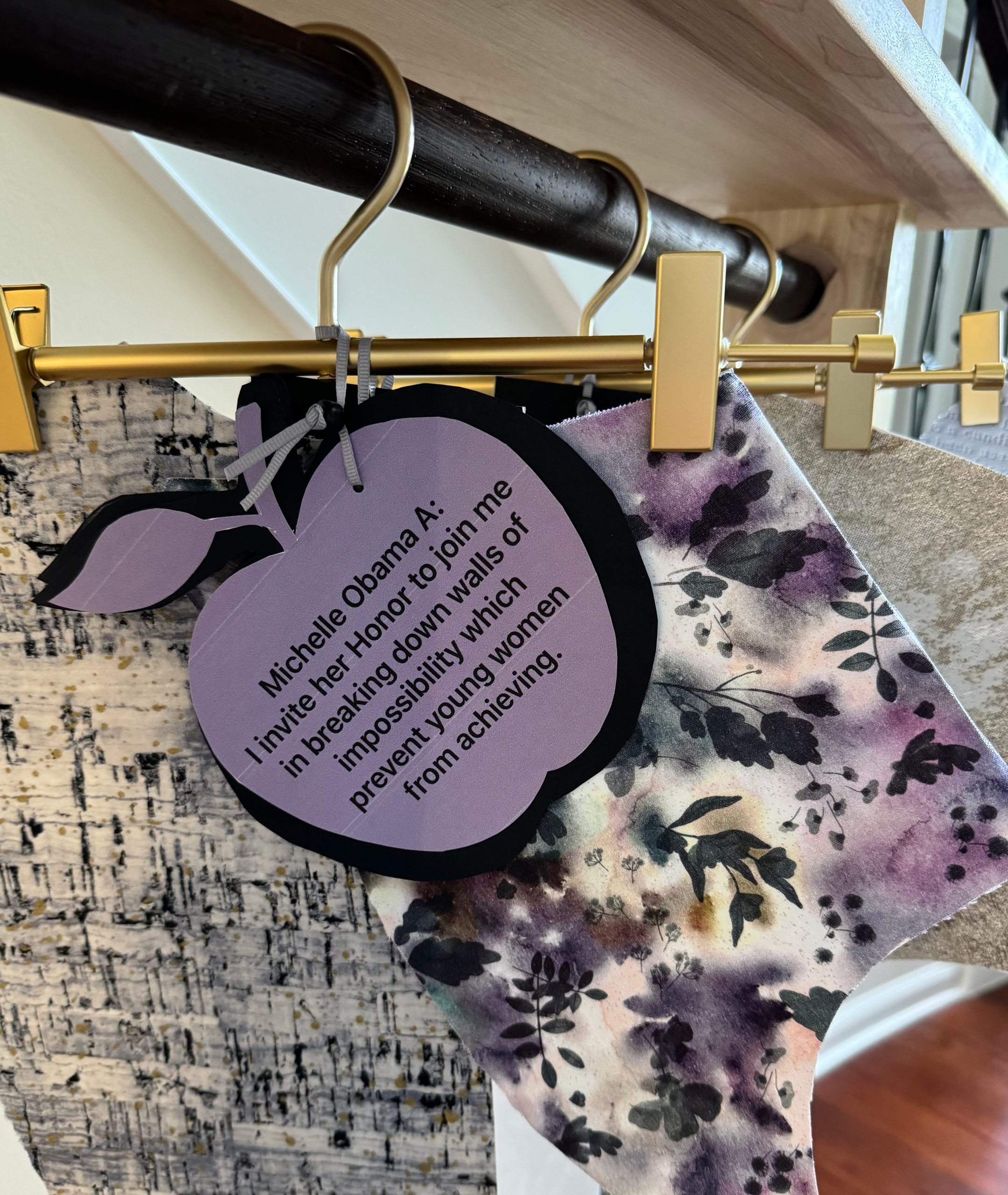
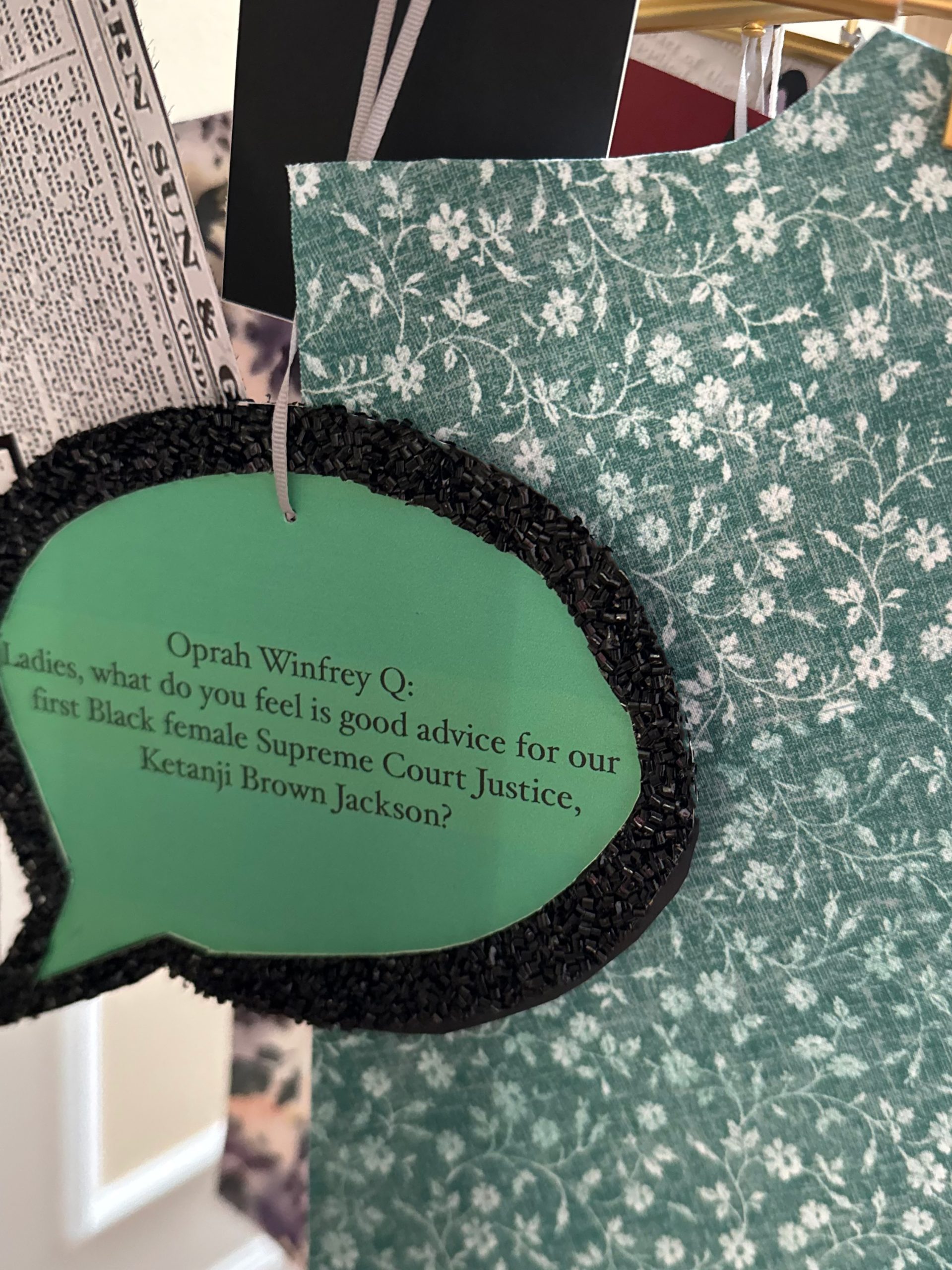
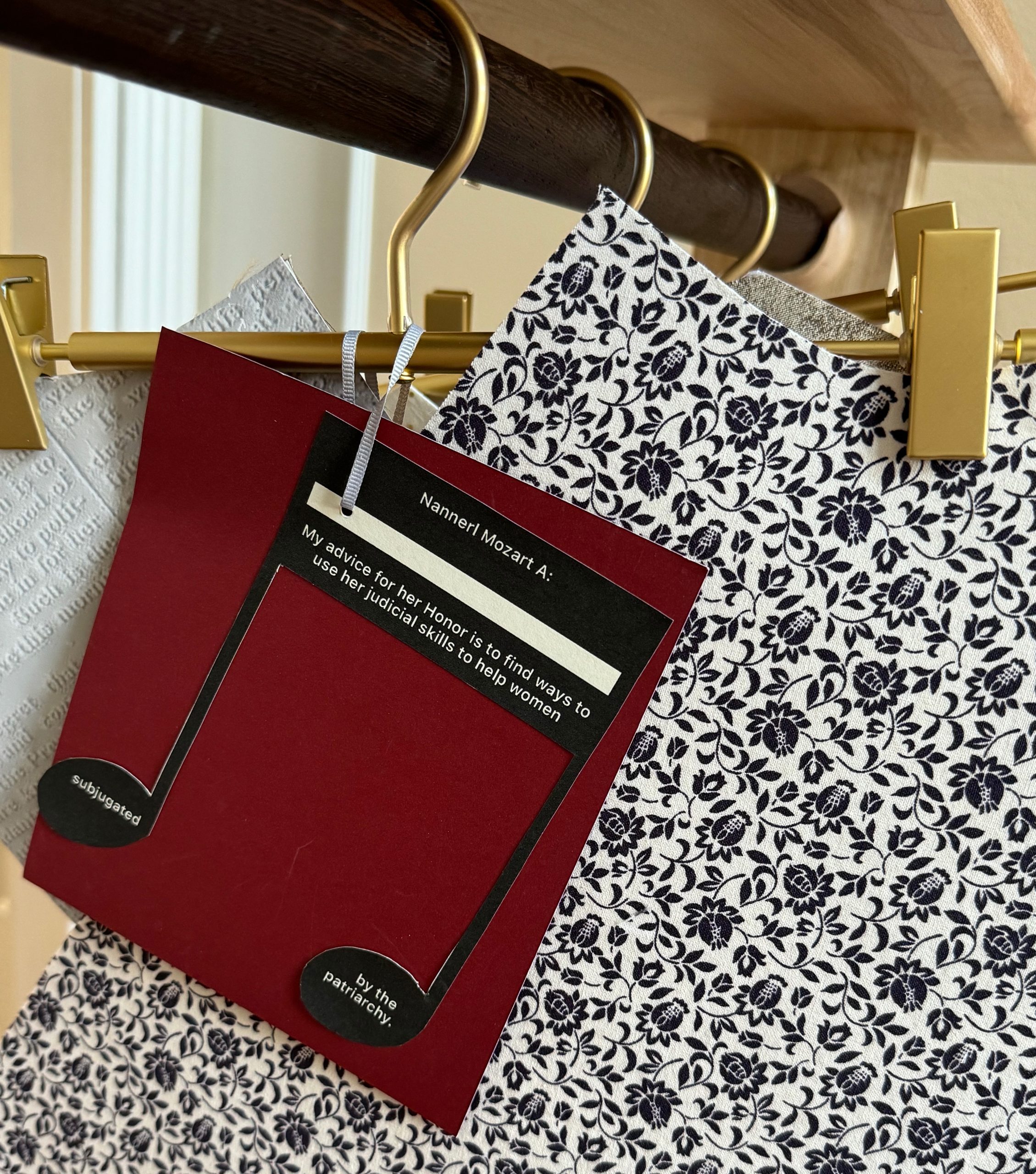
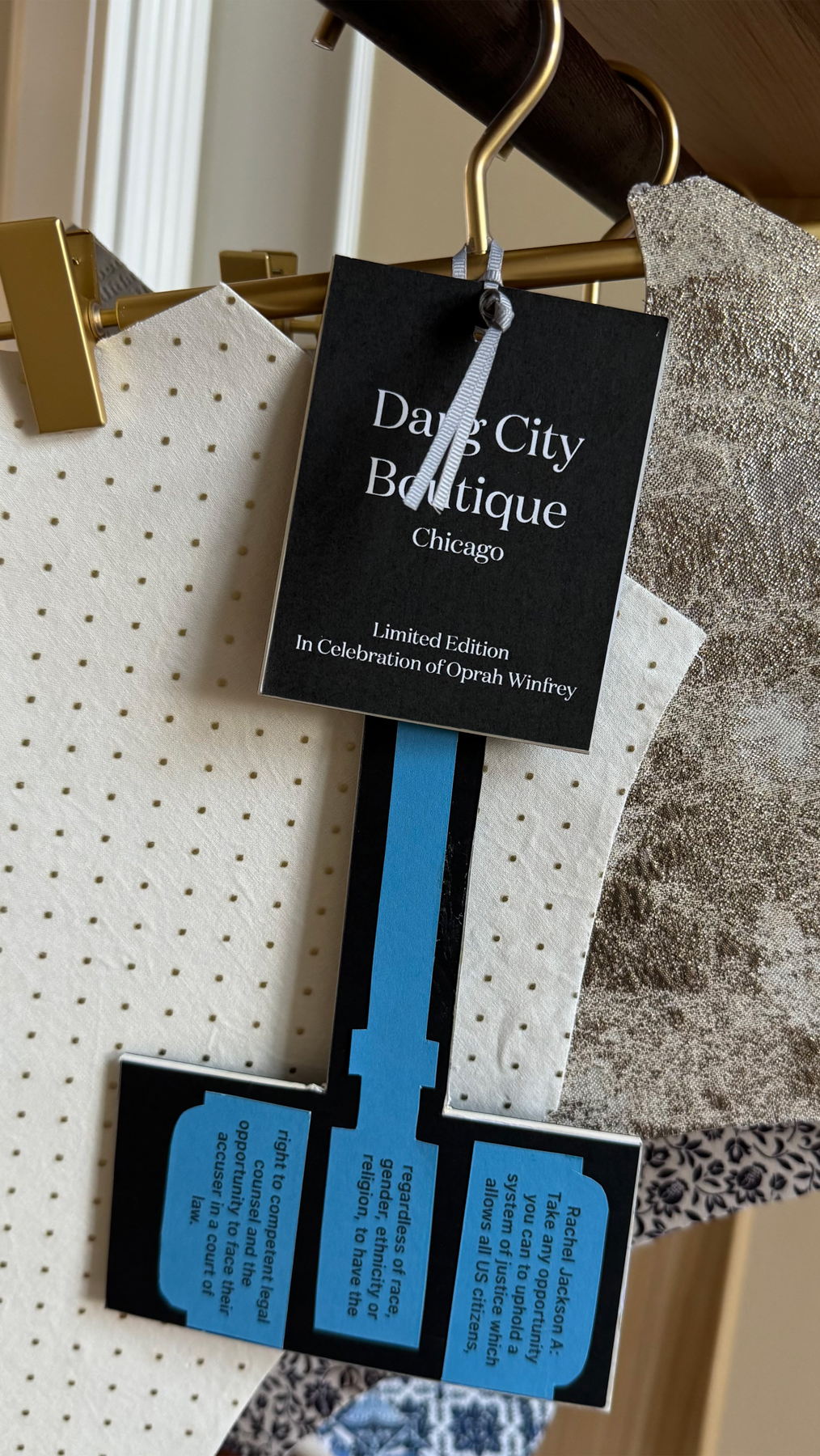
White Caste – Midwest
I define white caste as a stronghold made up of white men and women whose biases delineate others based on gender difference, religious affiliation, ethnicity, economic status, social acumen, levels of education and appearance. There are a plethora of sources available which substantiate causal factors. Amongst them are Charles Darwin, A New Life by John Bowley, Kyla Schuller’s The Trouble With White Women, and Isabel Wilkerson’s Caste, the Origins of our Discontents.
I have come to recognize that my recent works about white caste stem from my personal experiences as a cis-gendered, white woman who was born, raised and has primarily resided in the Midwest. Many of my caste experiences are an extension of the socio-economic status I was afforded at birth. I started working at a young age, went on to complete my Bachelor’s degree and worked in administrative roles until I had my second child. My spouse and I started our family five years after marrying, when it seemed feasible to afford children. I continued working as best as I could in a system which didn’t advocate for women during their childbearing years. I ultimately stopped working because my spouse’s salary trumped mine and we could best support our family with me at home caring for the house and children.
Today, most women must work to sustain both family and household. In 2021, 71.7 % of mothers were either working or looking for work, as compared to 92.5% of working dads. [1] According to Fortune, ’70% of families had a stay home parent in the 60s. Today, 70% of US women and children earn a paycheck.’ [2] So, I ask, shouldn’t we recognize and respect this as a societal norm? Shouldn’t we recognize that the skills needed to work in the home create who we are every time we walk out of it? Who I am was fostered from necessity: my sisters and I primarily cooked, cleaned, scrubbed floors and walls and worked minimum-wage jobs until and if we were able to get a college degree or a position which allowed us some measure of independence. We otherwise married and started our own families. These responsibilities weren’t a burden, they were a necessity.
My speculative task becomes a container which reflects what our contemporary male counterparts do to support the household when wives work outside of the home. In the 70’s, the advent of the ERA era, mansplaining and other methods were employed to undermine each woman’s worth, perpetuating racial caste. We cannot discount the fact that as recently as 1982, when the ERA amendment to our constitution didn’t pass, it was because Americans ultimately acquiesced to Phyllis Schlafly’s arguments that the ERA amendment would hinder women’s abilities to instill traditional family values. She argued: this role best supported the wellbeing of women (paraphrased). [3]
In reality, this ‘traditional’ structure is feasible only when there is a breadwinner in the household who earns enough to support it. How can society foster a system which identifies and overcomes unrecognized emotional stigmas stemming from historical familial or societal expectations? How can society create a more equitable distribution of resources which allows the family structure to flourish as well as the individuals who inhabit it?
These ideas imply that we must become better equipped to recognize how our actions stem from our individual mental and emotional aptitudes and the resulting limitations they impose on ourselves and others. I’ve always come to grips with my individual feelings of inadequacy by intentionally isolating myself and reflecting contextually on causal factors. My theory is that the nature of solitude cultivates awareness. If white men and women perpetuate racial biases through their own attitudes and behaviors toward one another, perhaps self-reflection can help us cope better with these biases.
My work examines racial bias as a spatial collage spanning time and place. People who reside in Los Angeles, California, for example, value and support the acting guilds; whereas, those who reside in Chicago, Illinois rely on the arts (theater, symphony, art history) for educating and sustaining their livelihoods. The wives of Beverly Hills, Malibu and Bel Air, differ from those in Hinsdale, Lake Forest and Wilmette in terms of what, when, why and how they prioritize events of their daily lives. But, I must add, I examine these topics through a midwestern-American feminist lens.
My speculative frames becomes prisms which reveal our inner natures. Can we come to grips with how we internalize the actions of others? How do our own self-inflicted penal systems help or harm us? Do our shortcomings force us to project anxieties, anger, discomfort, etc., onto others? Does this elusive process inadvertently foster caste biases? Does white supremacy automatically flow from dissatisfaction with unfulfilled feelings of dominance? What other apparatuses foster and sustain it (eg. laws, patriarchy, capitalism, political systems)?
Footnotes:
[1] USAFacts. How many moms are in the workforce? https://usafacts.org/articles/how-many-mothers-are-in-the-labor-force moms had a labor, to working dads’ 92.5%. Cited April 4, 2024.
[2] Kiernan, Peter D. How women can restore America’s’ middle class. Fortune. June 11, 2015. https://fortune.com/2015/06/11/how-women-can-restore-americas-middle-class/ Cited April 4, 2024.
[3] Longoria, Julia, WNYCStudios. More Perfect | Sex Appeal. Season 4. November 23, 2017. https://wnycstudios.org. Cited May 16, 2025.
